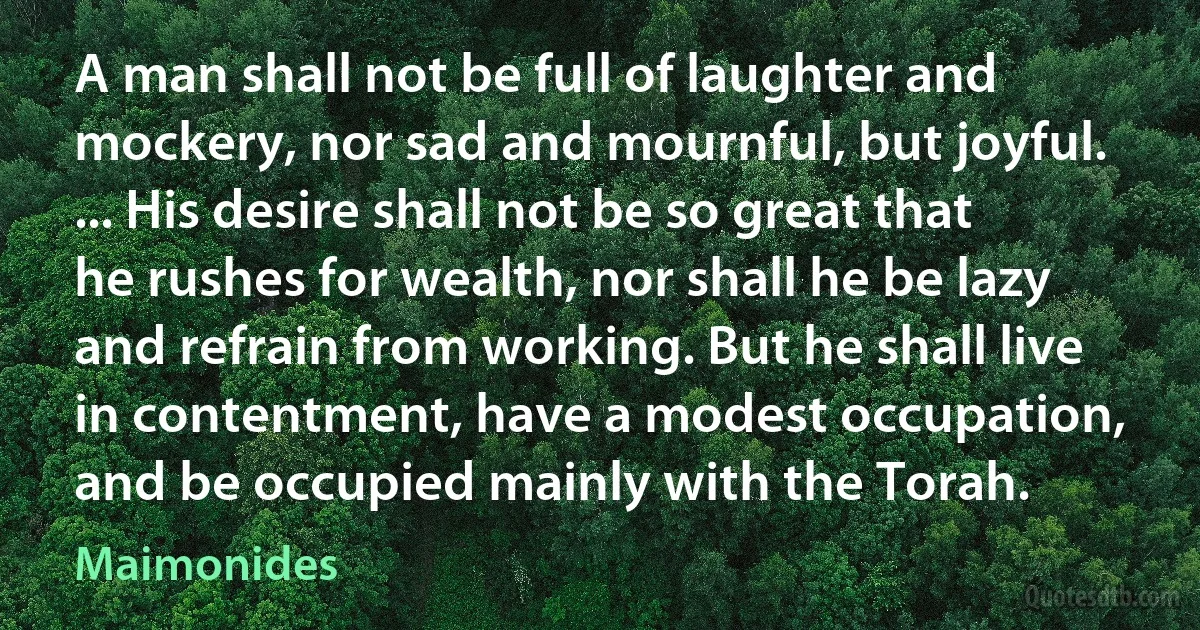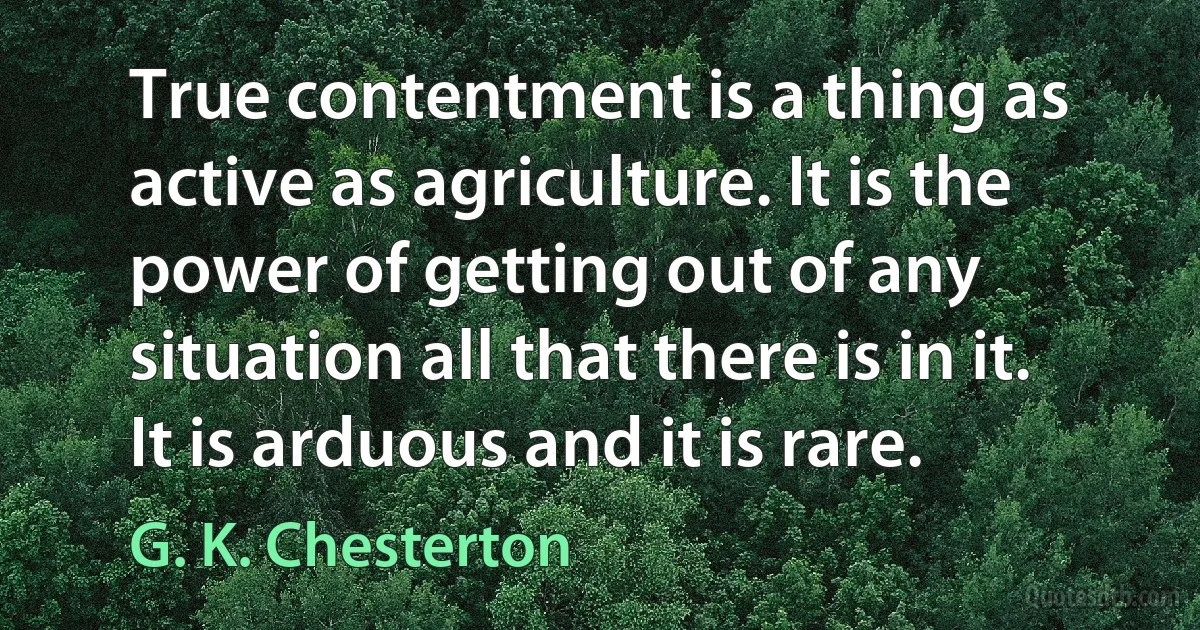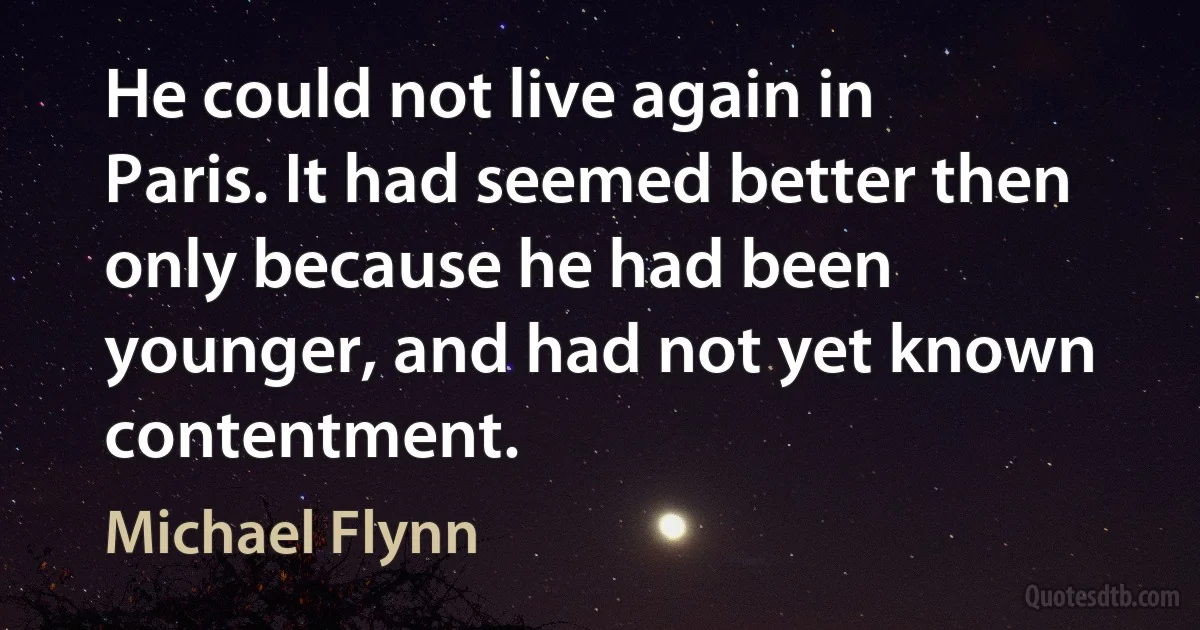Contentment Quotes - page 3
If the question of the distribution of wealth were solved for all society and all lived in average comfort and without urgent anxiety, the question would still be how many would be at peace with their own souls and have that enduring joy and contentment which alone can make the outward things fair and sweet and rise victorious over change.

Walter Rauschenbusch
Since the number of men is large but the earthly realm is not inexhaustible, one man can no longer profit from the labour of twenty. Moderation, contentment, and frugality must become the general morals of mankind. [...] The whole earth becomes a garden, and nature has at last completed her day's work here below, bringing permanent enlightenment, peace, and felicity together with the greatest possible number of men : she has anointed every man as his own judge, priest, and king; has turned the often-ridiculed tale of the golden age, mankind's favorite idea of old, into a reality by discreetly removing the eternal inequality of wealth, which has been ineffectively combated by all lawgivers and has always has crept back in, and which is the source of the decay of all nations, and the root of servitude, tyranny, and disunity among men, of venality and moral corruption, making it forever impossible through the excessive growth of the human population.

Adam Weishaupt
As we did without clergy, let us do without soldiers. The joy built upon successful slaughter is not the right kind of joy; it will not do; it is fearful and it is trivial. A boundless and generous contentment, a magnanimous triumph felt not against some outer enemy but in communion with the finest and fairest in the souls of all men everywhere and the splendor of the world's summer: this is what swells the hearts of the people of Omelas, and the victory they celebrate is that of life.

Ursula K. Le Guin
I have gradually come to one negative conclusion about the good life. It seems to me that the good life is not any fixed state. It is not, in my estimation, a state of virtue, or contentment, or nirvana, or happiness. It is not a condition in which the individual is adjusted or fulfilled or actualized. To use psychological terms, it is not a state of drive-reduction, or tension-reduction, or homeostasis.

Carl Rogers
I believe there is no permanent greatness to a nation except it be based upon morality. I do not care for military greatness or military renown. I care for the condition of the people among whom I live. There is no man in England who is less likely to speak irreverently of the Crown and Monarchy of England than I am; but crowns, coronets, mitres, military display, the pomp of war, wide colonies, and a huge Empire, are, in my view, all trifles light as air, and not worth considering, unless with them you can have a fair share of comfort, contentment, and happiness among the great body of the people. Palaces, baronial castles, great halls, stately mansions, do not make a nation. The nation in every country dwells in the cottage; and unless the light of your constitution can shine there, unless the beauty of your legislation and the excellence of your statesmanship are impressed there on the feelings and condition of the people, rely upon it you have yet to learn the duties of Government.

John Bright
We must mention the higher, nobler wealth, which does not belong to all, but to truly noble and divinely gifted men. This wealth is bestowed by wisdom through the doctrines and principles of ethic, logic and physic, and from these spring the virtues, which rid the soul of its proneness to extravagance, and engender the love of contentment and frugality, which will assimilate it to God. For God has no wants, He needs nothing, being in Himself all-sufficient to Himself, while the fool has many wants, ever thirsting for what is not there, longing to gratify his greedy and insatiable desire, which he fans into a blaze like a fire and brings both great and small within its reach. But the man of worth has few wants, standing midway between mortality and immortality.

Philo
I have often sung to drown my sorrow, but seldom to express my happiness. Crying for joy, and singing for joy, were alike uncommon to me while in the jaws of slavery. The singing of a man cast away upon a desolate island might be as appropriately considered as evidence of contentment and happiness, as the singing of a slave; the songs of the one and of the other are prompted by the same emotion.

Frederick Douglass
It was a life, she eventually concluded, that had been lived in the middle ground, where contentment and love were found in the smallest details of people's lives. It was a life of dignity and honor, not without sorrows yet fulfilling in a way that few experiences ever were. She knew Tuck understood that more than anyone.

Nicholas Sparks
Modesty is the decoration of poverty, thanks-giving is the decoration of affluence and wealth. Patience and endurance are the ornaments and decorations of calamities and distress. Humility is the decoration of lineage, and eloquence is the decoration of speech. Committing to memory is the decoration of tradition (hadīth), and bowing the shoulders is the decoration of knowledge. Decency and good morale is the decoration of the mind, and a smiling face is the decoration of munifence and generiosity. Not boasting of doing favours is the decoration of good deeds, and humility is the decoration of service. Spending less is the decoration of contentment, and abondoning the meaningless and unnecessary things is the decoration of abstention and fear of God.

Muhammad al-Taqi
What is the point of worrying oneself too much about what one could or could not have done to control the course one's life took? Surely it is enough that the likes of you and I at least try to make our small contribution count for something true and worthy. And if some of us are prepared to sacrifice much in life in order to pursue such aspirations, surely that in itself, whatever the outcome, cause for pride and contentment.

Kazuo Ishiguro
I stared at the water and saw the clouds reflected in it, saw them break to reveal the moon. It was the same moon I had known as John Daker. The same bland face could be made out staring down in contentment at the antics of the creatures of the planet it circled. How many disasters had that moon witnessed? How many foolish crusades? How many wars and battles and murders?

Michael Moorcock



